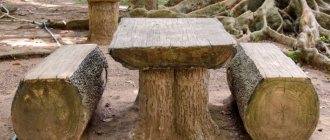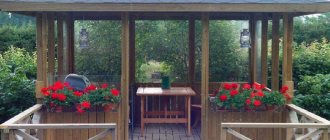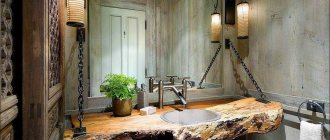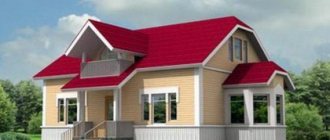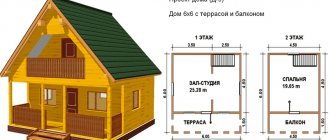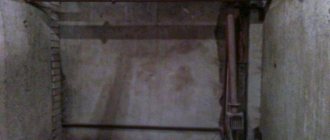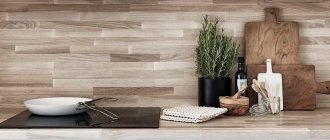Shelf design: stands and fasteners
The most fun part of this process is planning the contents of your shelf.
Here you can give free rein to your imagination, because it can serve as a basis for storing handicraft tools or stationery, flowers, books or toys. Choose what you need and, based on this, select the appropriate fittings. You can make one or more shelves on the canvas. This will require cuttings of the same laminate. Saw them into pieces of the required length and paint the cuts. For fixation, use corners or stands like these, which can be bought at any furniture fittings store.
By the way, try to choose furniture fittings for the shelf in the same color and style. It will give the product a finished look. And all the hooks and stands are usually attached to bolts. To securely fix all the parts, you will have to drill holes in the laminate. Therefore, prepare a drill with a drill of the appropriate size. The author used shelves and hooks of different sizes and shapes for the wall organizer. But note: they are all designed in the same style, and it looks very decent
Kitchen ideas
To prevent the remains of the laminate from gathering dust in the pantry, on the balcony or in the garage, they can be used wisely and profitably. Depending on the amount of remaining material, you can make small or large things: from boxes to pieces of furniture. A laminate apron looks great in the kitchen. This product lasts a long time, and caring for it is very easy.
Creating a kitchen apron from leftover laminate flooring will help save money, protect walls from dirt, and completely transform the room. To arrange it, you need to stick the lamellas on the walls one by one and snap their fastenings into place. In the corners at the joints it is necessary to trim the end locks of the laminate, and then cut holes for sockets.
In addition to the apron, the following kitchen items are assembled from pieces of this material:
- False beam or decorative box. Allows you to hide wires, hide ugly pipes, exhaust system.
- Cutting board. Even one lamella makes as many as 4 boards for cutting food. If you decorate them in different ways, you can make a whole set for working with meat, fish, vegetables and fruits, and bread. True, such boards will have to be washed carefully so that the laminate does not swell from water.
- Hot stand. Thanks to the laminated coating, the product will last for several years. You can place even the hottest dishes on it, because its thermal conductivity is quite low. Making a stand is very simple: just cut out a square or rectangular piece of material with a jigsaw. If you have a special jigsaw file, you can even make a small round stand for a cup of tea and coffee.
- Shelves for kitchen utensils. Before making the shelves, you need to make all the necessary measurements so that the furniture fits exactly in the right place. By the way, on the shelves of the bookcase you can place vases for small items and sweets, which are also made from laminate scraps.
Laminate cutting board
Key holder and hanger
Leftover laminate flooring is used to make interesting household items. For example, in the hallway, a key holder that is cut from just one piece of material looks great. The key holder is attached to the wall using double-sided tape or fastenings in hooks. To prevent the ends of the key holder from becoming unusable, they are coated with transparent silicone sealant.
For a hall or corridor, a laminate hanger is suitable, especially if an ordinary wardrobe does not fit here. To make it, cut out a piece of the required size, sand the edges with fine-grain sandpaper, and secure the top through the holes of the hooks. The lower part is glued to liquid nails, but this type of hanger is only suitable for light clothes. To place any, even heavy things on the hanger, you should attach it with self-tapping screws directly to the wall.
Crafts
Hand-made lovers probably already know what can be made from old laminate. Even a coating that has already served its useful life, but is still completely intact, can be reused for its intended purpose.
Among the ideas that allow you to use old laminate in a new way, you can highlight the following options:
- Dollhouse. By replacing wooden planks with laminate, you can significantly lighten its design without giving up the traditional design. The house can have several floors, stairs, doors and windows, as well as many other elements necessary for the game. You can do creativity together with your child. For a boy, you can build a fire station from laminate or an entire race track for cars with jumps and pit stops.
- Bird feeder or birdhouse. The planks are environmentally friendly and quite durable; even a schoolchild can make a small house out of them for feathered guests. Don't forget to stock up on slats to connect the parts.
- A house or bed for a cat. There is a huge scope for imagination here. You can create interesting multi-tiered structures with an emphasis on the wall - cats love to move around, make a bed for a furry pet or a secluded refuge for a mother with babies.
- Caskets and boxes. In such structures, made from ordinary laminate, you can easily store sewing supplies or small items. Several products of different sizes can be placed inside each other, like a nesting doll, or placed on a rack or shelf.
- Garbage container. An interesting solution to make the waste storage area more presentable.
- Toy box. It can be hanging or floor-standing, look like a chest with a lid, or resemble a laundry basket. The main thing is that with such an addition to the room, children quickly and easily learn to put their toys back in their place.
- Holder for network extension cable.
This list of ideas for using leftover material for floor finishing does not end there. It is enough to use your imagination to get truly beautiful and functional things.
Accessories for children's games
Only real specialists and craftsmen will be able to make a real miniature house from laminate with their own hands. This product is one of the most complex. It is important to think through everything down to the smallest detail. It should contain elements such as:
- doors;
- window;
- benches;
- fireplace;
- table.
This element will be dangerous to the child’s life due to the sharp corners of the boards. To avoid this, you will have to cover everything with felt. It is also advisable to upholster the inside of the house with soft material, the same felt or thin foam rubber. For fixation, you can use PVA glue or a construction stapler.
To fill the resulting house with all the accessories, you can connect the child and use other, safe materials, for example:
- cardboard;
- colored paper;
- paints;
- textile;
- foil.
They will make window sills and indoor flowers. Cardboard is used for pots and window sills. Polystyrene foam is placed inside, and flowers are cut out of colored paper. Everything is fixed with glue. Do not forget that to decorate a window you need curtains, which can be any scraps. They also cover the table.
As a result of time-consuming and painstaking work, you can get a real house from your child’s favorite fairy tale or cartoon. Each element will be thought out and taken into account, which will allow the child to come up with a variety of games and, importantly, study everyday life and develop fine motor skills.
Household crafts
Laminate leftovers will definitely come in handy around the house. From them you can build a variety of structures that are so necessary in any home. However, it is necessary to take into account the load-carrying capacity of the material.
For example, a laminate shelf may not be able to support heavy books, but it will be just right for shoes. Home craftsmen create many different simple furniture from laminate scraps.
- Shelves. They can be installed in the country house, and they also look good in the apartment. The design dimensions and shape are selected in random order.
- Old furniture is finished with laminate strips. Mostly country furniture is decorated. The scraps are placed in a chaotic manner to give the furniture a more decorative appearance.
- It costs nothing for a good craftsman to build a table from the remaining laminate. In your apartment you can install a laminate chest of drawers with a large number of different drawers.
- Old batteries spoil the appearance of the interior. They can be covered with a laminate shield. It looks beautiful and harmonizes with the flooring.
Ottoman made from leftover laminate
Drawers and shelves
Laminate is used to produce various items for storing things, shoes, toys, books, magazines, bags. For example, at the dacha, such boxes will help you maintain order by neatly arranging all the things lying around or placing them in winter storage. In the same boxes it is convenient to store vegetables, fruits, fertilizers and other country “attributes”.
In the bathroom, powders, household chemicals, and various household supplies are left in a decorated laminate box. Floor drawers will replace chests of drawers and bedside tables, and small boxes will help to successfully organize storage in a small space.
Shelf made of laminated parquet
You can use leftover laminate flooring to create shelves for any room. They are sawed to obtain strips of the required size, the locks are cut off, connected to each other and mounted on the wall using brackets. Such products cannot withstand heavy loads, so you should not put too large loads on them. Usually framed photographs, stationery, and toys are placed on laminated shelves. Also, shelves for shoes are created from laminate, while the outer frame is made of strong wood.
Features of using laminate residues
Laminate flooring is a special type of building material made from high-density fiberboard. Facing films are used as a protective coating. Thanks to this top, the lamellas are distinguished by their ability to withstand heavy loads and mechanical damage. The protective and decorative layer of the laminated coating is not afraid of temperature changes, moisture, and is antistatic. In appearance, laminate is similar to expensive flooring - parquet.
In addition, the popularity of multilayer material is also explained by its relatively low cost. You can use laminate in any room; its design can be very diverse, this also applies to texture. There are options on the market that successfully imitate stone, leather, and tile.
Laminated boards allow you to effectively decorate a wall and make the room cozy and original.
Important! When working with laminate waste, it is better to use a circular saw or jigsaw to obtain an even cut.
Many leftover laminate flooring ideas require joint locks on them. This is especially true for the process of decorating walls, laying mosaic floors or countertops. As an option, liquid nails or ordinary screws can be used to fix laminate waste, if additional wooden blocks are used.
The standard sizes of laminate boards are:
- length 300-1845 mm;
- width 90-330 mm;
- thickness 8 mm.
Advice! If products made from laminate residues will be used in conditions of excessive humidity, for example, as a container for growing flowers, then the inside must be protected with plastic film.
Guides for sliding doors
As you understand, the sash is not everything. Guides are needed along which these very doors will move. There are two of them - upper and lower. In appearance they differ significantly.
The top guide for the wardrobe door The bottom guide is made of metal
When installing the door, first insert it tightly into the upper guide, lift the sash all the way and place the lower rollers in the corresponding slot. The entire structure is shown in the following photo.
Assembly diagram
Laminate furniture
Not all home craftsmen consider the opportunity to make furniture with their own hands from leftover laminate flooring. But this material lives up to expectations. Having 1-2 whole packages of lamellas at your disposal, you can make the following from the leftover laminate:
- Wardrobe for the nursery. A lightweight storage system suitable for toys, small books, and clothes. Such a piece of furniture, made in the same color as the floor, looks especially interesting. Drawers, shelves, and lintels are made from the remains of the floor boards. It is better to choose an all-wood frame.
- Coffee table. It also looks impressive in the same color as the floor. To make the entire structure from scraps, you will need a machine that can cut the elements without chipping. It is better to make the legs from solid wood, covering them with lamellas.
- Shoe rack in the hallway. It uses a solid frame, complemented by laminated lintels and a top panel. The shoe rack can be multi-tiered - this will give it additional functionality.
- Wardrobe on the balcony for storing various household utensils.
Beautiful and practical furnishings made from laminate remnants can look no worse than factory ones if you take care of giving them the right shine. All cuts must be as neat as possible. It is better to protect the ends by painting or applying special sealants.
Ideas for using laminate in various styles (photo)
Surprisingly, laminate panels fit into various style trends:
If you want to highlight the country style, then select a darker texture. Preference is given to imitation logs, boards with a pronounced wood structure, natural timber. When high-tech style predominates in a room, pay attention to glossy material options. For modern classics, the most suitable imitation of light noble wood will be
In the eclectic style, various textures and the most unexpected shades can be used. It is important to remain organic and not get too colorful.
Functionalism. The complete opposite of minimalism style
A combination of various elements of several interior design styles and a large variety of decorative moments.
The neutral walls of the living room will be diluted by laminate flooring with the texture of natural wood.
Bright and laconic living room interior in Scandinavian style
- In a room decorated like a Swiss chalet, laminate flooring with imitation walnut and ash will look good. If preference is given to a pleasant, elegant Provencal style, then light, discreet finishing colors will be required, for example, bleached oak.
- In the Japanese style, muted accents look organically, which help emphasize minimalism in the overall interior design, elegance and restraint. There should not be more than three shades here. Preference is given to gray color.
The color and texture of natural wood in the interior will transform any room
Dark tones of laminate on the wall are best used in spacious rooms
The pop art style, which tends towards maximalism, dynamism, and audacity, allows you to pay attention to the laminate with green splashes and a blue background. This material will harmonize well with the bright patterns of creative furniture. With an avant-garde interior solution, you can use rich shades in wall decoration
Achromatic black and white options will also fit. For the Art Nouveau style, beige or mustard tones are selected. If possible, use plant imitation. The modern version of the Art Deco interior involves broken lines, so the laminate is selected with a similar solution.
Interesting design of a large living room with natural finishing materials
Eco style is popular among people of any age category and with various interests. Natural materials, living plants and flowers soften the bustle of the city
Mediterranean notes in the design of the premises are combined with appropriate bluish and purple shades. Imitation of pebbles and sand is possible.
Video
You can learn in detail how to make a laminate table from the video:
Another useful product made from laminate is a wall clock. How to make them? You will get the answer to this question in the video:
P
After repairs, there are often surplus building materials that you want to use so that they do not go to waste or go to waste. One of these materials is laminate - it is durable, but easy to use and it is a shame that such a building material will go to waste. As a rule, laminate is used in laying floors, but this is far from its only use, which is very important for those who have an abundance of this material. So how else can you use leftover laminate flooring?
From the remaining laminate with your own hands
you can make a bunch of useful and beautiful things and household items.
- flower pots;
- boxes for home mini-gardens, seedlings;
- shelves;
- toy furniture;
- tool boxes, etc.
All this can be easily created from the remains of this material. To provide additional protection from moisture, the inside of the products must be covered with polyethylene or other moisture-proof film. You can also put together boxes for storing some vegetables, to which you should also add a lid. Such a product is also useful simply for storing some things: children's toys, out-of-season shoes, tools.
If there are small scraps of laminate left, they will be suitable for stands for mugs and glasses or for hot dishes. You just need to cut a square or any other shape of a suitable size from an existing piece of laminate and use the resulting result for its intended purpose.
Long boards can be used as light shelves. Of course, they are not suitable for any things, because laminate is a lightweight material and can bend. But for light items, such shelves are quite useful - you can put keys, a small souvenir or a candle on them.
Crafts from leftover laminate
From the remains of laminate you can make not only light products, but also quite useful and strong things. For example, you can build a panel for radiators. Unfortunately, not all of them have a great design, so this decorative laminate panel will come in handy. And besides, this product will completely blend with the floor and not stand out from the overall scheme of the interior.
Laminate can be used quite creatively. For example, why not build a cat house from leftover laminate flooring
? Cat owners know how these furry animals love to hide in secluded places, which means this will be a great gift for their beloved pet. You need to cut out a door and a couple of windows in the house, but it is best to upholster the inside and outside of the house with a special material that will be convenient for the animal to sharpen its claws on. And in the absence of a cat, you can build a house for a child, supplementing it with children's furniture, also made of laminate. You can make a birdhouse or bird feeder.
Since we're talking about furniture, we can start making crafts that are more complex than a children's chair or shelf. From the remains of laminate, some manage to make quite strong stools, shoe racks, or use the material for decorating or finishing old furniture, although such delights are not suitable for every interior.
What else unusual can be made from laminate?
Finish the walls!
Yes, yes, laminate can be used on walls too! You can use solid boards and attach them additionally to the wall with screws, or you can make a decorative panel from various scraps of laminate. For example, if you cut equal rectangles from boards and fold them in a herringbone pattern, and then frame the composition, you will get an impressive and stylish decorative panel that can be hung like a picture. And the remains of the board left over from the craft should also be used: assemble a small box, glue another, but small panel, use it in the decor of some things. The scope for imagination is limitless;
you can make anything you can think of with your own hands from leftover laminate flooring After this, there will simply be no deposits of unnecessary laminate left!
Battery finishing
Laminate waste can be used to make screens for batteries and radiators. Such a device will hide an ugly heating device that spoils the appearance of the room. The screen also has a practical function - it protects against accidental burns. When creating such a device, you need to connect the boards in the standard way, covering the ends with self-adhesive tape. Afterwards, the shield should be drilled to the window sill, leaving holes at the bottom for air circulation.
DIY screen for a heating battery
You can make a lot of useful things using pieces of laminate or leftover solid boards. The main thing is to approach the issue with soul and imagination, and the time spent will turn out to be beneficial for your home and family.
Photo background
Beautiful photos, of course, require the skill of a photographer, but lighting, good technique, and background also play a significant role. There are companies that create and sell homemade photo backgrounds, but they are often too expensive and there is simply no money to purchase them. Making a photo backdrop from leftover laminate will be much cheaper and not at all difficult. So, let's look at the step-by-step procedure.
Preparation
To make a photo backdrop from laminate, you will need:
- six laminate scraps, at least 50 cm long;
- double sided tape;
- thick cardboard;
- instant glue;
- jigsaw;
- fasteners - furniture hinges;
- respiratory protection, gloves;
- acrylic paint, tools for painting.
After preparation, you can start working on our background.
Steps:
- First of all, let's fasten our three parts on the back side using double-sided tape, leaving one part of it taped. We will do similar work with three other parts.
- The next step is to mark all the irregularities, saw them off so that in the end we get identical rectangles from one and the second part.
- Next, our parts can be painted in the required color, or if the color of the coating suits you, you can leave the laminate with its original pattern and texture.
- After painting, you need to wait for the surface to dry completely and glue thick cardboard to the back of each of the parts according to their size.
- We secure our rectangles with furniture hinges and now the folding photophone can be tested. The main thing is don’t forget about light and good equipment.
But this is not the only option for using laminate scraps. You can also make interesting boxes that will fit exactly into the color scheme of the room.
Window decoration
Window slopes and window sills are finished with laminate. The result is a beautiful combination of window and floor, and the room takes on a harmonious appearance. It is always recommended to lay a whole board on the windowsill, rather than individual cuttings. Before starting work, they dismantle the old slopes, clean the surface, foam the space, and then begin finishing the window.
Finishing window slope with laminate
Mounting methods
Installing laminate on the wall differs from the method of laying it on the floor. The main difference is the lack of a single technology. Various options for fastening panels are allowed. The main condition is strength and reliability of fixation on the supporting plane or structure.
The main condition is to provide thermal gaps that compensate for the expansion of the lamellas when heated or absorbing atmospheric moisture. Seasonal expansion of the laminate noticeably changes the linear dimensions of the material. If the cladding is made too tightly, when the composition of the air changes, the canvas will begin to swell and the joints will break down. The entire surface may lose its decorative value and will require replacement.
There are different ways to install laminate panels. Let's take a closer look at them:
Without sheathing
Installing laminate flooring without sheathing is the most popular installation method. It allows you to save the volume of the room; you can subsequently install wall furniture on the paneling, hang sconces or paintings in the usual way. The only limitation is the condition of the surface. If the wall is uneven, full of waves or completely crooked, the adhesive joint will not be able to provide sufficient strength.
With lathing
Lathing is a system of planks installed on the wall perpendicular to the intended direction of laying the panels. It allows you to cover uneven walls that are full of dents. No preliminary preparation is needed in this case. The lathing is installed so that the surface of the planks forms a flat vertical plane.
The disadvantages of this method are:
- due to the additional operation, the installation time increases;
- costs for wall cladding increase;
- the bearing surface of the canvas is limited.
If you plan to hang shelves, lamps or other objects, it is necessary to install mounting platforms in advance. They must be rigidly fixed to the wall, and the surface is located in the plane of the sheathing strips. Once installed, the laminate panels fit snugly into the mounting pads, allowing you to attach wall items in the usual way.
Using clamps
The clamps provide some movement of the panels, which allows the canvas to maintain its flatness during seasonal changes in size. Outwardly, they look like metal plates with a bent edge. The plate is screwed to the sheathing, and the edge presses against the bottom of the connecting groove. The next panel closes the clamp and is fixed to the sheathing in the same way. The principle is simple, installation is quick. However, this requires a wooden base - a lathing or a wall. If the base is brick, then under each fastening element you will have to drill and insert a wooden plug, which will delay the installation for a long time.
Bonus: furniture restoration
Old furniture, especially in the country, can be quite easily updated using laminate. It is enough to fix the new panels on top of the worn surface of the furniture. The most important thing is that after such “modernization” the furniture will retain its strength and durability.
Continuing the theme of any person.
P
After repairs, there are often surplus building materials that you want to use so that they do not go to waste or go to waste. One of these materials is laminate - it is durable, but easy to use and it is a shame that such a building material will go to waste. As a rule, laminate is used in laying floors, but this is far from its only use, which is very important for those who have an abundance of this material. So how else can you use leftover laminate flooring? From the remaining laminate with your own hands
you can make a bunch of useful and beautiful things and household items.
- flower pots;
- boxes for home mini-gardens, seedlings;
- shelves;
- toy furniture;
- tool boxes, etc.
All this can be easily created from the remains of this material. To provide additional protection from moisture, the inside of the products must be covered with polyethylene or other moisture-proof film. You can also put together boxes for storing some vegetables, to which you should also add a lid. Such a product is also useful simply for storing some things: children's toys, out-of-season shoes, tools.
If there are small scraps of laminate left, they will be suitable for stands for mugs and glasses or for hot dishes. You just need to cut a square or any other shape of a suitable size from an existing piece of laminate and use the resulting result for its intended purpose.
Long boards can be used as light shelves. Of course, they are not suitable for any things, because laminate is a lightweight material and can bend. But for light items, such shelves are quite useful - you can put keys, a small souvenir or a candle on them.
Crafts from leftover laminate
From the remains of laminate you can make not only light products, but also quite useful and strong things. For example, you can build a panel for radiators. Unfortunately, not all of them have a great design, so this decorative laminate panel will come in handy. And besides, this product will completely blend with the floor and not stand out from the overall scheme of the interior.
Laminate can be used quite creatively. For example, why not build a cat house from leftover laminate flooring
? Cat owners know how these furry animals love to hide in secluded places, which means this will be a great gift for their beloved pet. You need to cut out a door and a couple of windows in the house, but it is best to upholster the inside and outside of the house with a special material that will be convenient for the animal to sharpen its claws on. And in the absence of a cat, you can build a house for a child, supplementing it with children's furniture, also made of laminate. You can make a birdhouse or bird feeder.
Since we're talking about furniture, we can start making crafts that are more complex than a children's chair or shelf. From the remains of laminate, some manage to make quite strong stools, shoe racks, or use the material for decorating or finishing old furniture, although such delights are not suitable for every interior.
What else unusual can be made from laminate?
Finish the walls! Yes, yes, laminate can be used on walls too! You can use solid boards and attach them additionally to the wall with screws, or you can make a decorative panel from various scraps of laminate. For example, if you cut equal rectangles from boards and fold them in a herringbone pattern, and then frame the composition, you will get an impressive and stylish decorative panel that can be hung like a picture. And the remains of the board left over from the craft should also be used: assemble a small box, glue another, but small panel, use it in the decor of some things. The scope for imagination is limitless, from the remains of laminate with your own hands
you can do anything you can think of! After this, there will simply be no deposits of unnecessary laminate left!
When laying a laminate floor is completed, both whole laminated panels and scraps will remain. If there are enough of them left (we don’t consider the necessary supply for possible repairs), you can find a worthy use for them. What can you make from laminate scraps with your own hands? Beautiful and necessary items that are needed either in the economic, practical sphere of life, or will become decorative items, will decorate the interior of your home.
Photo report on the assembly
First, all profiles are cut exactly to the calculated dimensions. The accuracy must be perfect. The cut is strictly perpendicular, at 90°. Holes are drilled in the handle profiles for installing rollers and fasteners.
The holes are made through two diameters. The exact size depends on the dimensions of the purchased fastener, but basically there are two sizes: 4 mm and 6 mm, as well as 6 mm and 10 mm.
How to drill holes
One such hole is made at the top, the center of which is located at a distance of 7 mm from the edge of the profile, at the bottom there are two holes - the first at a distance of 7 mm from the edge, the second at a distance of 42 mm from the profile cut.
Holes at the bottom of the side profiles
During assembly, all parts of the filling are assembled first. First, if there is glass or a mirror, sealing rubber is installed around the perimeter. It is simply put on the end of the part by pressing a finger. The seal is cut off along the edges and placed end to end, but without overlapping on the next side.
Seal on the mirror
A protective film is glued to the back of the mirrors. You can use regular self-adhesive. This film will prevent fragments from scattering if the mirror breaks.
If the sash is composite, we assemble it using connecting profiles. The filling parts are simply inserted with force into the profile. Sometimes considerable effort may be required. You can tap the end with the back of your hand or use a rubber mallet for this.
Simply insert the filling parts into the grooves of the profile and tap on the end
When the sash is assembled, the corresponding profiles are installed at the top and bottom using the same principle.
Top profile installed
Then it’s time to install the side handle profiles. Everything is the same: push the filling into the groove, make sure that it fits all the way along the entire length without distortion. When the frame is assembled, it is necessary to tighten it with fasteners. Let's start from the top. Take the fasteners and insert them into the previously drilled hole. If the distance was measured accurately, the screw fits into the groove of the upper cross member.
If drilled correctly
Tighten the connection using a hex wrench. Slightly not tightening it all the way, insert the upper rollers between the screw head and the profile jumper, then tighten the screw.
Insert the upper rollers
We repeat the same operation on the other side. Then we move down. Here the fasteners are installed in the upper hole. Just tighten it all the way. We repeat similarly on the other side.
Install the fasteners from below
Next, install the lower rollers. We insert the thrust plate into the groove and press it.
Installing the lower roller - insert the plate into the profile
We press the spring, tucking the roller body inside. We insert a screw into the hole, trying to get into the socket, and tighten it with a hexagon. You may need it in a different size - slightly smaller than the others - since this screw is usually thinner and longer.
Press the roller, insert the screw
There is no need to tighten it all the way. So that it goes into the plate half a centimeter or so. Then, when installing the door and adjusting its travel, this screw adjusts the position of the sash - the angle is raised or lowered.
Tighten the screw that fixes the roller
If you press the roller wheel, it will go into the housing, then return due to the elasticity of the spring. This simple mechanism ensures smooth movement of the sliding wardrobe door.
Having assembled all the sashes, we proceed to installing the guides. They must be located strictly one below the other, even without deviations of a millimeter. Use a plumb line or a laser level (read how to use a laser level here).
First screw on the top guide. It is attached either to the ceiling or to the top of the cabinet. The distance from the shelves is at least 100 mm, otherwise the doors will touch shelves, things, and hangers.
Screw on the top guide
We insert bumper springs into the grooves in the lower guide from the sides. They will limit the movement of the door. The number of springs is equal to the number of leaves; they are installed at both ends.
Door stoppers Insert travel limiter springs
If you don’t have a laser level, so you don’t have to worry about plumb lines, you can start by simply laying the bottom guide without fixing it yet. Then install one blade, placing its upper rollers at the top and installing the lower ones in the desired groove. This way the doors will connect the upper and lower guides.
Having aligned the sash vertically, automatically align the bottom guide
By aligning the canvas strictly vertically, you will automatically align the lower guide. All that remains is to screw it on. Just be careful that the doors do not move.
The last thing left to do is to glue the Schlegel on the sides. This is a fleecy self-adhesive strip that softens the impact of the sash on the walls of the cabinet (or simply on the walls, if the cabinet is frameless).
The final touch is the Schlegel sticker
Here the wardrobe doors are installed and ready to go. You can watch the process again in the video.
Advantages and disadvantages of laminate countertops
The main advantages of laminate countertops are as follows:
- By comparing prices for different countertops, buyers are convinced that laminated countertops are cheaper. This is understandable; inexpensive components are used in their manufacture, and this determines affordability;
- It’s easy to keep your countertops clean; just periodically wipe all surfaces with a damp cloth. To remove stains from the material, stain removers and cleaning solutions are used;
- the manufacture of laminate countertops can be made in different shapes; during manufacturing, you can join individual elements and get one that cannot be made by casting;
- laminate is durable; with proper and timely care, countertops of this type can be used for more than ten years. The presence of protective components in the structure of the laminate allows it not to lose color saturation during prolonged exposure to sunlight.
Countertops in the kitchen
Unfortunately, such countertops also have certain disadvantages:
- Laminate does not withstand prolonged heating well. If heat during its production gives the surface the desired rough texture, then hot objects left on the surface can also leave a mark. Therefore, to prevent thermal damage to the material, you need to place hot dishes on the stove using heat-protective supports or stands. For most users, this is a simple requirement; the habit of using stands is developed from childhood;
- laminate is a moisture-resistant material, but prolonged moisture has a negative effect on the surface. The fact is that there are always microcracks that are invisible to the eye. Moisture penetrates through them into the countertop. Accumulating in depth, it causes the chipboard or other material inside to swell. Further delamination of the material is possible;
- Some craftsmen, when joining the tabletop, allow for small differences in size or height. These shortcomings will appear during further use of the tabletop. Therefore, competent craftsmen and quality control workers check the laminated surface with a special palpation. Take a piece of paper and place it under your finger. Run your finger along the surface through the paper. It turns out that receptors sense unevenness through paper better than through direct contact with the surface.
There are not many shortcomings, they are easily eliminated. Laminate countertops are a very interesting solution for a modern kitchen.
average rating
more than 0 ratings
Share link
Aluminum
The optimal material for guides, but at the same time expensive. High strength allows you to withstand any weight of the structure. The rollers move along the aluminum guides smoothly and silently.
Aluminum guide
Designer crafts
But this is not all the ideas that can be realized with the help of leftover floor coverings. You can prove yourself as a real designer and make unique things that will delight not only the guests of your apartment, but also the children. For girls you can make a real dollhouse. The finished product will definitely delight your child, as you will make the dream of most girls come true
It is important that this product is safe for the child, so it should not contain parts that can injure:
- Sharp corners;
- Hard elements that can cause injury;
- Toxic materials (for example, it is better to choose PVA glue, it is safe and does not have an unpleasant odor).
It is necessary to decorate the dollhouse both inside and outside with soft elements:
- Textile;
- Felt;
- Foam rubber;
- Cardboard
If you want to please your significant other or mother or grandmother, then try making a beautiful box from leftover laminate flooring to store jewelry, costume jewelry, or even the family budget. The box can be made in the form of a regular box with a lid. If possible, line the inside with soft fabric, such as velvet or faux suede. Decorate the top with buttons or glue a few coins.
Many people use laminate boards as a stylish decoration for walls and ceilings. Thanks to this method, you can easily divide any room into zones, dividing it into several small spaces. This technique is often used in the bedroom and kitchen, for example, to separate the work area from the eating area or the work space from the rest area. When using flooring on the wall, you get perfectly flat and smooth surfaces. In such cases, laminate flooring with imitation of natural wood is often used, which adds elegance to the room and makes the room feel homely.
If you want to surprise your guests and friends, make a wall panel out of these boards. Let your imagination fly and you will get a real work of art. It could be a mosaic of pieces of different textures or some kind of geometric pattern. If desired, you can apply a design with paint or use photo printing, which is now a very fashionable trend in modern decor. Place your panel in a wooden frame and decorate an empty wall in your apartment. You can also use panels in the form of a triptych and a diptych, placing them sequentially in the room.
If you are into photography, shooting in a photo studio, then a photophone can be very useful to you. It can be of absolutely any size depending on your needs. The most popular now is aged wood, with faded paint, scratched. It's not difficult to do. All you have to do is connect the boards together, scratch them a little and apply acrylic paint to the surface, let it not dry completely and “remove” the paint in several places with a sponge or cloth. In addition, you can combine different laminate textures to give a certain individuality to the background.
Very often, needlewomen resort to this technique. They photograph their work on small photo backdrops imitating natural wood or stone, so the work looks impressive and sells faster.
We have told you only about a few options for using leftover laminated surfaces that are easy to use in life.
To learn how to make a shoe rack from leftover laminate that will decorate your interior, watch the following video.
Panel
Using your imagination, you can make a stylish designer item. For example, laminate is used to create interesting wall panels. Such paintings look harmonious when the shade and texture match the floor covering or have a contrasting color. For large panels, solid lamellas are used, which are laid in a horizontal or vertical direction. The choice of arrangement of elements depends on the size of the room: in small rooms, panels with horizontal laying look better, in large rooms - with vertical laying. For rooms with low ceilings, you should choose a product that is slightly below the ceiling.
Wall panel made from small pieces of laminate
Laminate panels can be original in appearance. For example, individual elements are arranged diagonally, in a herringbone pattern, in a checkerboard pattern, like parquet. This type of work will require more patience and accuracy, as well as a significant amount of laminate. If desired, a drawing is applied to the finished panel with paints or photo printing is done in a special studio, and then it is placed in a frame.
Shelves made from laminate scraps
Shelves have long been used to add functionality to the interior. They were mounted on walls, placed on the floor or suspended from the ceiling. In addition to various methods of fastening, a variety of materials were used for decoration: wood, stone, metal. Modern construction technologies have significantly expanded this list. Although laminate is not a material intended for furniture production, it can still be used to make room interior elements.
Required tools and materials
Laminate is an easy-to-process material. It is made from sawdust held together with moisture-resistant glue. However, the specific fibrous structure imposes restrictions on the use of fasteners - self-tapping screws tear the panels and cannot provide reliable fixation. To make a neat shelf, you need to have on hand:
- A hacksaw for wood or metal. It will take longer to cut the laminate last, but the edge at the cut site will be smoother.
- Screwdriver or drill.
- Wood jigsaw.
- Sander or plane (manual or electric).
- Wood glue or any other suitable for working with fibrous materials.
- Fastening hardware.
Hanging shelf
The simplest option for making a space “expander”. The idea behind the shelf is to hang a length of laminate on ropes or ribbons. In this case, the design can be either single- or multi-level. The first option is a straight strip of laminate suspended from the wall. The floor covering is processed only from the ends to remove the interlocking joints. A multi-level shelf must be drilled in the corners. Ropes are threaded into the holes made to secure the plates in a horizontal position.
Frame
The rigid design of the shelf is more complex in design, but it can withstand the weight of a load placed on it up to 20 kg. Its dimensions depend on the purpose and free space where they plan to hang it. The structure consists of a horizontal shelf, a vertical base and two supporting brackets. Work progress:
- Cut two laminate plates of equal length. The ends of the blanks are processed and covered with decorative tape.
- Make side supporting walls. The figured pattern is cut out with a jigsaw.
- The long plates are connected in a T-shape, leaving 3-4 cm at the bottom. The joints are coated with universal glue. At the joints, to strengthen the structure, they are fixed with self-tapping screws.
- Install the sidewalls (coating them with glue and fastening them with screws).
- Holes are made in the upper part of the shelf for mounting it on the wall.
For books
Laminate can be used to make an excellent shelf for books or magazines. However, in order for the structure to withstand a lot of weight, a higher grade material should be used. If the strength of the strips is not enough and they bend under the weight of books, you can glue two pieces of laminate together. Assembly sequence:
- Cut two vertical and horizontal pieces. They are processed along the perimeter with a plane to remove the “locks”.
- Prepare additional brackets to strengthen the structure. They are made from wooden blocks or metal corners. The length of the brackets is equal to the width of the shelf.
- Connect the laminate pieces into a rectangular structure. Brackets are placed in the corners. All mating surfaces are lubricated with glue and fastened with self-tapping screws.
Sash design
The wardrobe door leaf consists of profiles:
- lower; The lower profile has deeper sidewalls
- upper;
Upper profile for sliding door leaf - handle profile; The handle can stand on both sides
- intermediate.
- These profiles are placed between parts of the door leaf, but you can do without them - if the door is solid and not composite
All this together looks like in the photo. The door material you choose is inserted into this frame, into the grooves. It can be glass, mirror, chipboard and other materials.
Sash design without filling
Separating profiles are optional. They are needed if you assemble the sashes from different materials or you simply like them this way better. The maximum thickness of the filling material is 10 mm, the minimum is 4 mm. Thinner ones - glass, plastic, mirror - are inserted through a sealing gasket.
In order for the sash to be able to move, rollers are installed on it - at the top and bottom. The lower rollers bear the entire weight of the door, and the upper rollers stabilize the vertical position of the leaf, preventing it from deviating.
Rollers for wardrobe doors
The rollers are attached to the side profiles using special fasteners.
